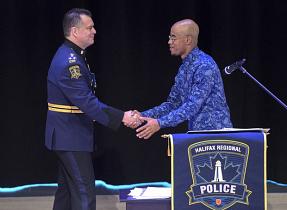Far too many times, we have failed you’: Halifax police chief issues historic apology for racial profiling
Rockmen Parris stood at the back of the room on Friday, listening to the Halifax police chief’s historic apology for racial profiling by officers, and couldn’t help thinking about his own family history.
His grandfather, Gerald Parris, fought and trained alongside white soldiers in the Second World War, but wasn’t allowed to go to the Legion when he returned home. When the City of Halifax demolished Africville, a black seaside community that flourished until the 1960s, Mr. Parris’s family was booted from their land.
That same systemic racism that has been a fact of life for black Nova Scotians for centuries still exists today, he said. That’s why he greeted Halifax Regional Police Chief Dan Kinsella’s apology over the now-banned practice of street checks with cautious optimism.
“I take it with a grain of salt, because words are different than action,” Mr. Parris said. “But I remain hopeful. This is a good thing. If they can change, it might snowball into a bigger thing.”
Chief Kinsella said street checks – a practice that stopped black people at a rate six times higher than whites, according to a recent study – often left young black men feeling humiliated and only deepened mistrust of the police. The controversial policy of logging information about people that police interacted with was banned last October after it was deemed illegal.
The practice of police street checks is under fire across Canada. A recent study found the Montreal police force engages in systemic racial profiling that targets Arab, black and Indigenous people at a far higher rate than whites. Ontario regulated street checks, also known as carding, based on evidence they were used for racial profiling, in 2015.
In 2018, an Ontario Human Rights Commission report found police were far more likely to kill and injure black people than white people. It said a black person in Toronto was nearly 20 times more likely than a white person to be shot by police, and found black people remain overrepresented in violent police interactions.
Chief Kinsella said racial profiling will not be tolerated, and pledged to hire more black officers, start a “know your rights campaign," form an advisory committee of black community members, improve sensitivity training and personally look into complaints of mistreatment at the hands of police.
“Far too many times, we have failed you,” Chief Kinsella said, as hundreds from the African Nova Scotian community gathered at Halifax’s central library.
“I acknowledge the community's concerns that the actions of police have had a negative and deep impact on generations of the African Nova Scotian community and disproportionately on young black men."



